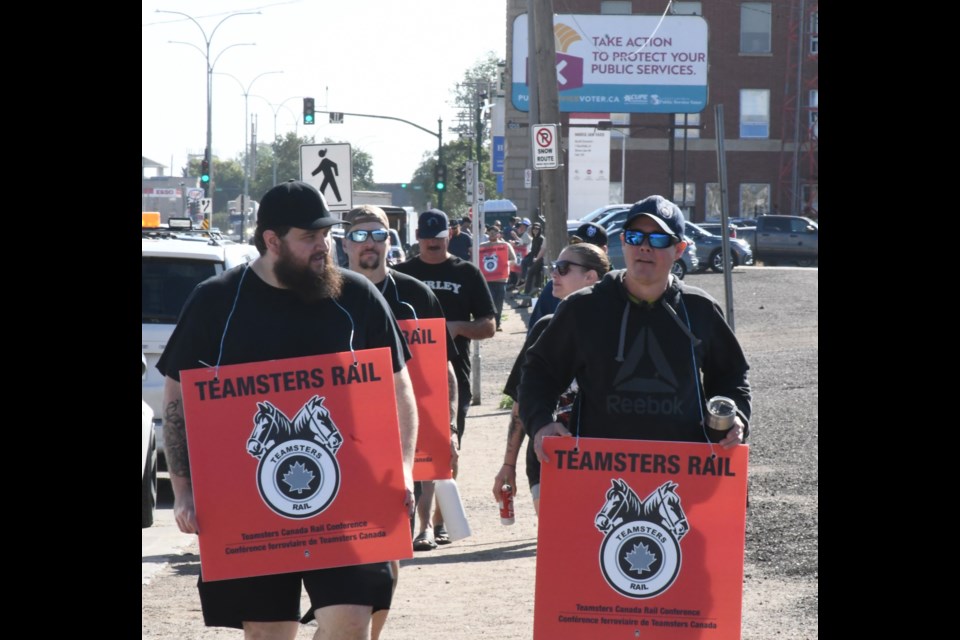The sound of trains chugging through the rail yards usually fills the air along Manitoba Street East, but that clickety-clackety has been replaced by motorists honking their horns to support the locked-out workers.
About 320 Moose Jaw-based locomotive engineers from Canadian Pacific Kansas City (CPKC) hit picket lines at 7 a.m. on Aug. 22 after their employer locked them out, along with thousands of other employees across Canada.
Canadian National Railway (CNR) also locked out its locomotive engineers, making this the first time in history that both national railway companies have locked out their staff simultaneously.
Chad McPherson, a Moose Jaw-based legislative rep for division 510 with the Teamsters Canada Rail Conference (TCRC) union, made it clear that employees from both rail carriers had been locked out and were not on strike, contrary to what some residents thought.
“They (residents) think we’re here because we don’t want to work — we want to work,” he said.
McPherson clarified that the union went on strike in reaction to the lockout, a move that protects their collective agreement rights should the federal government impose back-to-work legislation.
The union plans to run two 12-hour shifts during the lockout — daytime and nighttime — with teams of locomotive engineers picketing three hours at a time.
“We want to show to the public as much as we can that we’re being locked out and that we want to go back to work,” he said.
The union says both companies are pushing to weaken protections around rest periods and scheduling. Moreover, it says CN is seeking a scheme that would see some employees move to far-flung locations for several months at a time to fill labour gaps.
“They basically want us working longer hours and with less time at home,” McPherson said.
The 30-year CPKC employee said that new regulatory rest rules were supposed to create a better environment for staff, but their “misapplication” by the rail carriers has created more fatigue instead. Furthermore, employees have less knowledge of when they’ll receive time off in addition to the irregular scheduling.
McPherson said he’s never experienced a regular home life during his three decades with the company because of inconsistent scheduling. This has made it impossible to commit to any social activities.
“If someone were to say, ‘Could you make this event tomorrow?’ I would say, ‘I don’t know,’” he stated. “I’ve never been able to plan (for anything). I’ve missed birthdays … (and) weddings (and) anniversaries (and) a lot of special occasions because of the scheduling.”
The union wants the rail carriers to honour the collective agreement, offer consistent scheduling so employees know they have dedicated rest days and provide better train lineups, the union rep said.
“We just want to be treated fairly. Over the years in my career, we’ve made more concessions than we have received,” McPherson added. “And it’s time, with these billion-dollar profits these companies are making, that they need to honour those employees that are making those profits for them.”
In a news release, CPKC said it had remained committed to avoiding a work stoppage during nearly a year of negotiations. It said it had bargained in good faith, but despite its best efforts, it became clear that a negotiated outcome with the TCRC was not within reach.
“The TCRC leadership continues to make unrealistic demands that would fundamentally impair the railway’s ability to serve our customers with a reliable and cost-competitive transportation service,” the rail company said.
CPKC said binding arbitration is required since it “is an effective, reasonable and fair process that has been used many times to resolve disputes with this union.” The company also said federal intervention has been required during nine of 10 rounds of collective bargaining negotiations since 1993.
“We fully understand and appreciate what this work stoppage means for Canadians and our economy,” the company said.
“CPKC is acting to protect Canada’s supply chains — and all stakeholders — from further uncertainty and the more widespread disruption that would be created should this dispute drag out further, resulting in a potential work stoppage occurring during the fall peak shipping period.”




